Betting on black
Everyone said they were crazy to walk away from good jobs to... make soap?
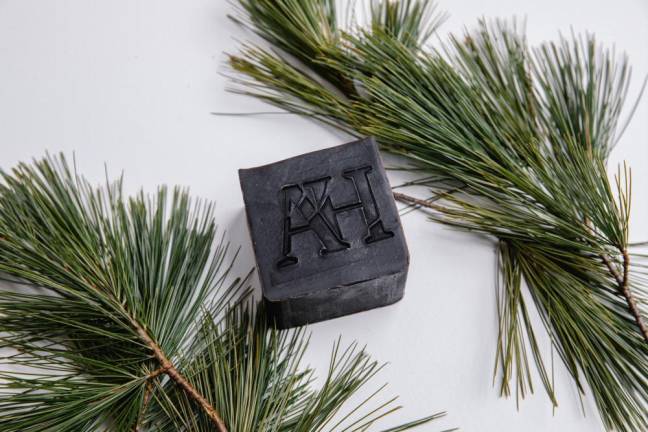
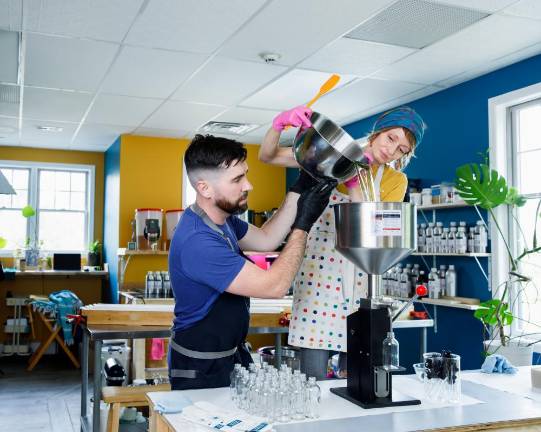
( )
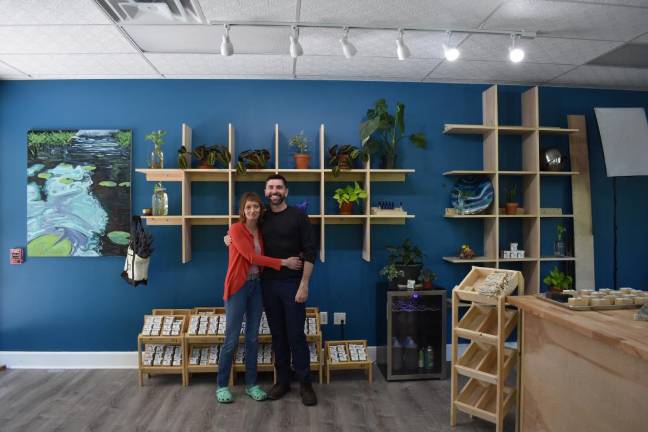
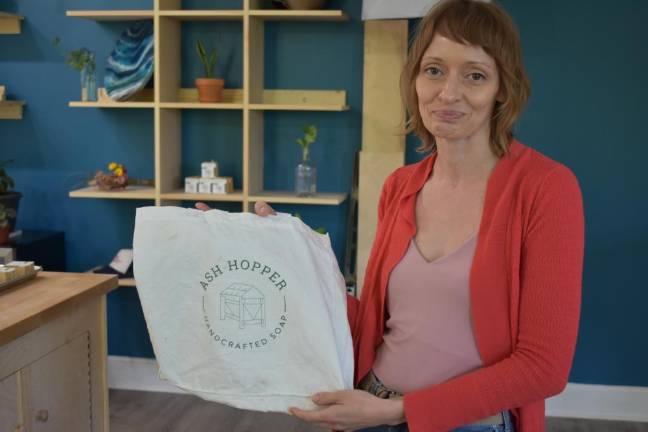
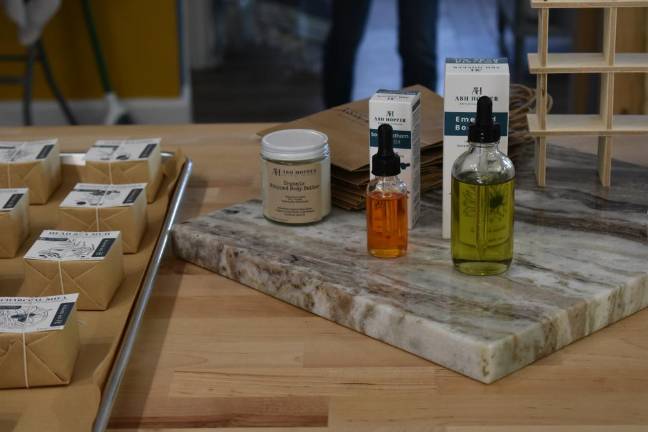
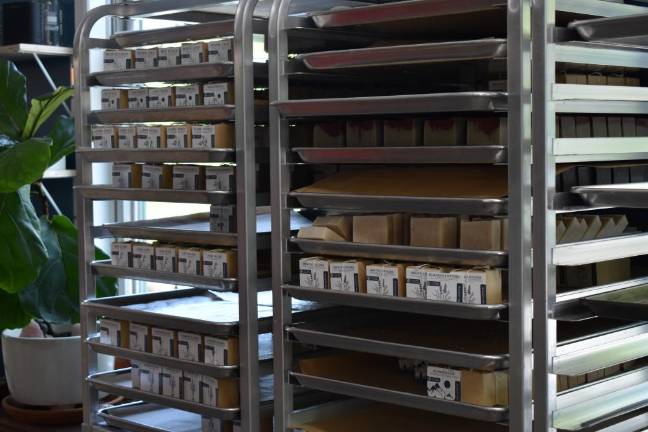
I met Matt Donnelly two years ago at a farmers market where he was selling soap – selling it with every fiber of his being. The father of a then three-year-old, Matt had just quit his job as a hospital MRI tech. His wife, Thena, had walked away from the salon she co-owned. They had traded the stability of that life to take a shot at the one they’d always dreamt about.
Their new undertaking involved staying up until 3 a.m. to prepare for a 5 a.m. departure for a farmers market. It required shelling out their life savings to buy bulk ingredients, like pallets of essential oil from a generationally owned family farm in Ecuador, kegs of lavender oil from Bulgaria and 55-gallon drums of pine tar from Sweden. Everyone they knew said they were crazy.
I left the Goshen Farmers Market that afternoon with a hefty haul including a pitch-black bar that exuded a powerful smell of a primal campfire, and a shampoo bar: herbal mint, I recall, because it is still, incredibly, on the soap dish in the bath, where it has diminished to the size of a hotel soap but is still very much in play.
I stocked up that spring day because I could tell that this was yummy soap, and – let’s face it – who knew how long this scrappy mom-and-pop outfit would survive. The Donnellys’ story is an inspiration, but inspiration doesn’t pay the mortgage or fill the fridge.
Desperation: the mother of invention
Ash Hopper, the company, is officially a Covid baby, registered as an LLC in November 2020. But the origin story goes back much further. “This is the bar that drove all of my excitement in this world,” said Thena, of the inky cube on the table that launched her down this path some 15 years ago.
A severe eczema sufferer, Thena’s topical steroids had finally stopped working for her. “Literally my whole body was covered, head to toe,” she said. “I looked like a lizard.”
Desperately researching healing ingredients, she came upon Swedish pine tar. “I tried it out, made a soap with it. It was challenging to produce. It’s a very hard bar to make,” she said. Made from an extract of the Scots pine tree, pine tar was used to waterproof Viking ships and boasts a 2,000-year tradition of being used to treat skin conditions like Thena’s. When she eventually nailed the formulation, “it was lifechanging,” she said.
The pine tar bar, among their priciest at $13, remains Ash Hopper’s best-seller, popular at New York City boutiques and camping stores alike. “It’s super bold. You either love it or you hate it,” said Matt.
“It’s not that that was the miracle component,” Thena explained. But along with dietary changes and increased mindfulness about what she put in and on her body, her skin cleared up. “I saw what that did for me. I was like, what else can plants do?” she wondered. “There are these stories attached to ingredients that go back centuries. Things that have stood the test of time. That type of knowledge, you can’t really argue with that,” she said. “I guess I got addicted to that connection.”
Thena called her fledgling operation Ash Hopper, after a pre-Colonial device that stored ashes to make lye for soap “back in the days of waste not,” she said. With help from her mom, Thena began selling her soap at the Florida Farmers Market. It was around that time that Thena met Matt outside the Middletown bar where she was slinging drinks to put herself through beauty school. Sometimes Matt would visit Thena at the farmer’s market. Even back then, Matt was onboard. “I thought, I want to do this with you one day,” he recalled.
Launching Ash Hopper may have struck friends and family as some wild departure, but it is actually more like a return to the shared vision. “It was the original intention,” said Thena.
A fine arts major, Thena had been pursuing a cosmetology license for the express reason that she felt the credential would help her launch her soap. Then life happened. Thena got sucked into the world of cutting and styling hair, and Matt finished x-ray school and got a full-time job doing traveling MRIs. And so the Ash Hopper dream got put on the shelf.
But it never went away. On the contrary, as Matt and Thena each made their way down their separate career paths, the dream kept reappearing around every odd corner. There it was, presenting itself as an answer to one seemingly intractable problem after another.
As an MRI tech, Matt specialized in women’s imaging. He often heard patients say, “Doctor’s got me eating organic and got me off of synthetics. I’m very much reading labels.” Why was that conversation the exclusive domain of oncologists, he wondered. If it had taken place 20 years earlier, would so many patients still be coming in, sick and scared? His mom, an oncology nurse, tells him she is still overhearing these same conversations.
Covid’s chaotic steamroll was the kick in the butt the Donnellys needed to take the leap. “Covid made everything seem like it was a little bit more of a façade, almost. It didn’t matter how well you thought you were established, something could come along and take that out. So we thought, let’s focus on ourselves and maybe we can build a family business, just like all those guys did before us,” said Matt. “If the world’s ending, who knows, let’s just gamble on something that we’ve wanted to do for a really long time.”
Launching Ash Hopper would allow them to spend more time with their son, whom Thena sometimes wouldn’t see for an entire weekend after working long shifts at the salon. “I remember Monday coming around and I’m like, I haven’t seen my baby for three days,” said Thena. “I felt like there was something inherently wrong with that dynamic.”
“We were working so much, and it’s like, what are you working for?” added Matt.
And so they made the leap. Their skillsets complemented each other. Thena was coming from the worlds of art and beauty; Matt, from the realms of science and medicine. It felt like the culmination of both their career arcs to join forces at the intersection, working crazy hours but together this time, all in the name of really good soap.
It felt right – and “very terrifying,” said Matt. “Lot of high anxiety situations. In order to be able to sell products at the right price, you have to pony up a lot up front. You really have to be confident that you’re going to be able to sell those products to take your life savings and put it all into raw ingredients.”
At the beginning, Matt was doing farmers markets and still working at the hospital. “And then it came down to a point where this was taking all of our time and we had to make the choice: am I going to stay at the hospital or are we going to do Ash Hopper? And we chose Ash Hopper and haven’t looked back.”
No more messing around
Three years later, the Donnellys are coming out of the gate hot. “We knew that we had to come into our third farmers market season well branded, well represented, no more messing around. We did our beta year,” said Matt.
In March, they moved their operation from their Slate Hill home into a 900-square-foot space in Warwick, behind Noble Pies, that’s part workshop, part store – “what do we call this, a distribution studio?,” Matt asked Thena. The morning of my visit, the molds were out and clamped to the stainless steel worktable. It was Tuesday, pour day, when Thena makes the week’s stock of 240 to 300 pounds of soap, pouring liquid ingredients into the long, rectangular mold to harden into three-foot-long “loaves.”
The space, formerly an unremarkable white office, is freshly painted yellow and blue, fitted out with birch benches, counters and shelves built by Matt and his dad, a retired union carpenter. House plants stretch toward every window. The brand’s aesthetic, nailed down over the winter in partnership with a graphic designer in Oslo, has a name: “Japandi,” for Japanese and Scandinavian.
The Donnellys finally found this designer after a frustratingly long search. He had one thing that the half-dozen other marketing creatives they’d interviewed lacked: the unique advantage of never having been to an American farmers market.
The designers they’d interviewed previously – hailing from granola hot spots like New York City, San Francisco and Eugene, Oregon – “had this template of what our category was supposed to look like,” said Matt. “And we knew right away that those aren’t our people because we don’t want to be, in your face, I made this in a barn type thing. We love our farmers, we are big on our farmers, but we don’t need to make our products in a barn nor do we need to come off like we do.” Their Oslo guy, by contrast, who specializes in designs for law firms, financial services, architecture firms, came up with a “clean, modern look” that the Donnellys found refreshingly different from anything else at farmers markets.
The breakneck pace has continued unabated. “Right now we’re at that space where we’re too small to hire somebody, but too big to do it on our own,” said Matt. “We’ll be here all night long sometimes. We’ll bring Rowan,” their son, now 5, “then bring him home, Grandma will come over, maybe do a second shift, work all night to get our racks filled.”
But as opposed to in their old life when they were like ships in the night, now they’re doing it together. They get to listen to the music they feel like listening to, grab a cup of coffee when they want, talk to interesting customers at beautiful farmers markets overlooking the Hudson.
At their New York City markets, they’ve gotten to know some of their regulars who are themselves successful entrepreneurs. “There’s a lot of that New York City blood,” said Matt, “that old school business-building that gets me excited.” Week after week, a few of those relationships have developed into something more; the exchange of a bar of soap accompanied by a side of mentorship and cheerleading. These heavy hitters are living proof that the world is indeed big enough for dreams like the Donnellys’.
“We didn’t have much growing up, and it was always like – this is what you had to do, you had to work,” said Matt. “You had to work, work, work. Find a job that pays really well and you work that. Maybe go to school, maybe don’t, or find a craft. But then you talk to these people,” he said, and they illuminate a different path. “There’s so much opportunity, you really can do anything as long as you’re willing to put in the sacrifice. Because there is such a huge sacrifice to this.”
On Mondays, their day off, Matt and Thena try to get to their rock climbing gym in Poughkeepsie. But often as not they’ll also swing by the studio to do some prep work for the upcoming week. People tell them it’s important to take time for themselves, and they don’t disagree. They hope to get to that eventually. But for right now, it just feels right to keep their foot on the gas.
“The second we stop, people are all running the same race and the second you slow down...” said Matt, trailing off. “I just feel like we have to keep our momentum going.”
Trust issues
Ash Hopper’s aggressive commitment to the environment has earned them a following that skews younger – and more skeptical. It’s a crowd that doesn’t mind paying an extra dollar for a fully compostable box made of FSC-certified paper, but won’t tolerate B.S. They appreciate when Matt tells them: “You guys are too smart to fall for the beard oil thing.” Men’s skin care has ballooned into a billion-dollar industry, a balloon that Matt has no qualms about popping. Beard oil, beauty oil, cuticle oil – it’s all the same stuff, and the whole family can share it.
“I know this generation behind us has big trust issues with large companies, and they really enjoy, you know, when they get to talk to a business owner,” said Matt. “When someone buys something from us at the farmer’s market, my closing statement is always, ‘Thank you for your trust.’ Because that’s what this is. You’re buying skincare from a stranger at a farmer’s market, you’re putting it on your skin and you’re bringing it home to your family. That’s huge in my book.”
To earn that trust, Matt stands ready to do a lot of talking – a skill he developed as an MRI tech, he says, to help nervous patients feel more comfortable. “Education is probably our biggest task, getting people to understand what we do and how we’re different,” he said.
Starting at $10 a bar, Ash Hopper soap is exponentially pricier than a bar of Dove or Dial. It also lasts about three times as long, said Matt, and contains no fillers or nebulous ingredient called “fragrance.”
“It’s expensive because the ingredients are expensive,” said Matt.
The big point Matt tries to get across, as diplomatically as possible, is that not all handmade soaps are created equal. In fact, it’s a bit of a pet peeve. Ash Hopper often doesn’t get into farmers markets because their category is filled, but it might be by a part-time hobbyist who uses cheap synthetics with a loose hand.
“Usually when a market tells us sorry we have someone, it’s usually a neon soap, something wrapped in plastic, something that’s laden with synthetic micas and fragrance oils,” Matt said.
The Donnellys go to great lengths to source table-worthy ingredients and to procure them from small family farms, locally whenever possible. “Just as you make best sandwiches from fresh tomatoes grown right down the road,” said Matt, the best skincare comes from fresh ingredients, picked recently, ideally nearby. They buy turmeric and ginger from Madura Farm in Goshen, hemp from Black Dirt CBD and lavender buds from Lavenwood Farms in Washingtonville.
“Many people – the same ones who clamor for organic farmers market produce – have no idea that there are chemicals banned in Europe that are used in everyday products here,” said Matt. “You are very passionate about your food not being sprayed, but then you go soak in a bath of chemicals.” The vast majority of customers who migrate to their farmers market stall report having some sort of skin issue or sensitivity, said Matt, but few think to question the prime suspect sitting in the soap dish.
“No one’s afraid of these chemicals,” Matt clarified. “It’s just a conscious choice: ‘I just want to live a little cleaner, it’s so complicated out there, what’s an easy way to do it?’ That’s all we want to try to do is get people excited about using cleaner products, and not let it be a thing reserved for someone who has money. We want everybody to get a piece of it.”